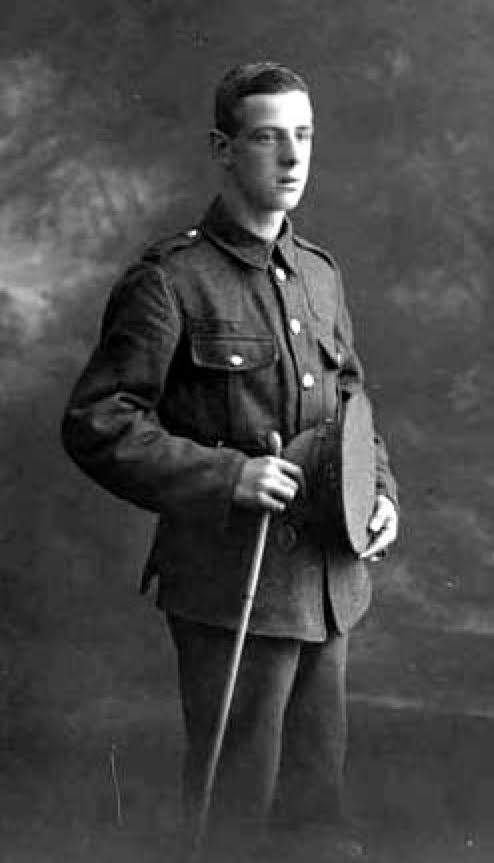Cpl
William Joseph Donnan
Information about birth
|
Date of birth: 27/01/1895 |
|
Place of birth: Hulme, Lancashire, England, United Kingdom |
General information
|
Profession: Clerk |
Army information
|
Country: England, United Kingdom |
|
Force: British Expeditionary Force |
|
Rank: Corporal |
|
Service number: 9843 |
|
Enlistment date: 14/09/1914 |
|
Enlistment place: Manchester, Lancashire, England, United Kingdom |
|
Units: — Manchester Regiment, 2/9th Bn. (Last known unit) |
Information about death
|
Date of death: 09/10/1917 |
|
Place of death: Augustus Wood, Passchendaele, Belgium |
|
Cause of death: Killed in action (K.I.A.) |
|
Age: 22 |
Memorial
|
Tyne Cot Memorial Panel: 120 |
Distinctions and medals 3
|
1914-15 Star Medal |
|
British War Medal Medal |
|
Victory Medal Medal |
Points of interest 3
| #1 | Place of birth | ||
| #2 | Enlistment place | ||
| #3 | Place of death (approximate) |
My story
Corporal William Joseph Donnan served in the 2/9th Battalion Manchester Regiment (66th Division, 198th Brigade). The young clerk was born in Hulme and lived in Manchester with his mother, brothers and sisters. His brother George Albert served in the 15th Battalion of the Royal Scots and was killed on 1 July 1916 at the Somme. When William was 19-years old he enlisted in the army. In February 1916 he got wounded in an accident in Rouen, France. William transferred to the 2/9th Battalion Manchester Regiment on 8 July 1917 and was promoted to corporal on 1 August 1917.
On 9 October 1917, the 66th participated in an attack towards the Passchendaele heights. It would later be officially designated as the Battle of Poelcapelle. The 66th Division’s attack would be carried out by Battalions of the East Lancashires and Lancashire Fusiliers, together with the 2/9th and 2/10th Battalions, Manchester Regiment. The men of the 2/9th had started their march from the reserve positions, through heavy rain. As day turned into night, the men slipped off the roadways, fell into shell holes and had to be pulled free by their mates. The going was slow and it was not until 4.45am that they were fully in position. They had been ‘on the go’ for eleven hours and were cold, wet and hungry. All four companies lined up in the front trenches ready to go over the top in the first wave. At 05.20am, the artillery started shelling the German lines and, four minutes later, the infantry advanced through the quagmire up the Passchendaele Ridge. They immediately came under severe artillery and machine-gun fire and, as they neared the German lines, they were fired upon by German snipers scattered in shell holes in front of their own trenches. The Manchesters continued, in spite of mounting casualties, capturing their first objective. They cleared German dugouts in Augustus Wood and captured some prisoners. At around midday they were to continue the advance to Heine House, but the men were so exhausted and their numbers were depleted that any further advance was impossible.
Units who had managed to make some progress were ordered to return to the first objective at Augustus Wood where all the troops had consolidated a line. In the early evening, a German counter-attack was fend off by rifle and artillery fire. A total of 113 members of the 2/9th Battalion had been killed. Among them was corporal William Joseph Donnan, aged 22, whose name is honoured on the Tyne Cot Memorial panel 120.
On 9 October 1917, the 66th participated in an attack towards the Passchendaele heights. It would later be officially designated as the Battle of Poelcapelle. The 66th Division’s attack would be carried out by Battalions of the East Lancashires and Lancashire Fusiliers, together with the 2/9th and 2/10th Battalions, Manchester Regiment. The men of the 2/9th had started their march from the reserve positions, through heavy rain. As day turned into night, the men slipped off the roadways, fell into shell holes and had to be pulled free by their mates. The going was slow and it was not until 4.45am that they were fully in position. They had been ‘on the go’ for eleven hours and were cold, wet and hungry. All four companies lined up in the front trenches ready to go over the top in the first wave. At 05.20am, the artillery started shelling the German lines and, four minutes later, the infantry advanced through the quagmire up the Passchendaele Ridge. They immediately came under severe artillery and machine-gun fire and, as they neared the German lines, they were fired upon by German snipers scattered in shell holes in front of their own trenches. The Manchesters continued, in spite of mounting casualties, capturing their first objective. They cleared German dugouts in Augustus Wood and captured some prisoners. At around midday they were to continue the advance to Heine House, but the men were so exhausted and their numbers were depleted that any further advance was impossible.
Units who had managed to make some progress were ordered to return to the first objective at Augustus Wood where all the troops had consolidated a line. In the early evening, a German counter-attack was fend off by rifle and artillery fire. A total of 113 members of the 2/9th Battalion had been killed. Among them was corporal William Joseph Donnan, aged 22, whose name is honoured on the Tyne Cot Memorial panel 120.
Sources 6
|
"6th Battalion The Manchester Regiment in the Great War, Not A Rotter In The Lot", Hartley J., Pen&Sword Military, 2010, page 208 - 211 Sources used |
|
"Passchendaele The Day-by-Day Account", McCarthy C., Uniform 2018, page 120 - 122 Sources used |
|
Ancestry https://search.ancestry.co.uk/cgi-bin/sse.dll?indiv=1&dbid=1543&h=533784&tid=&pid=&usePUB=true&_phsrc=WPK1&_phstart=successSource Further reference |
|
CWGC https://www.cwgc.org/find-war-dead/casualty/1630215/donnan,-william-joseph/ Sources used |
|
The Long Long Trail http://www.longlongtrail.co.uk/army/regiments-and-corps/the-british-infantry-regiments-of-1914-1918/manchester-regiment/ Sources used |
|
War Diary http://www.nmarchive.com/view-diary/ypres/3141-4601/1056057/page/460 Further reference |
